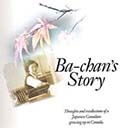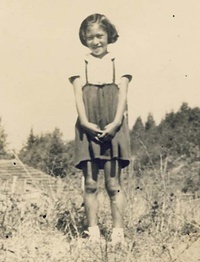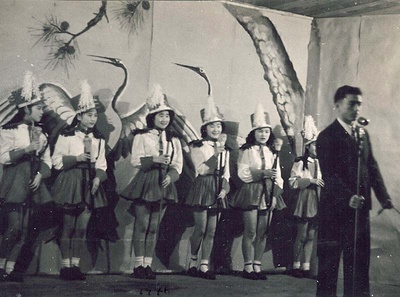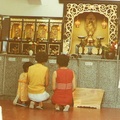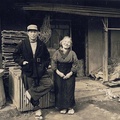Introduction*
Ba-chan’s Story (Grandmother’s Story) all began because Dr. Midge (Michiko Ishii) Ayukawa, Historian; former Board Member of the Japanese Canadian National Museum; and a former Lemon Creek family friend asked me to participate in “Changing Japanese Identities in Multi-cultural Canada Conference.” Midge was the chairman and part of the organizing committee for the conference held at University of Victoria, Centre for Asia-Pacific Initiatives on August 22–24, 2002. The guidelines for the “Oral History Panel” were to be based on turning points of my identity due to changing events and people influences during the course of my life. My presentation was “Shi a wa se to be Japanese Canadian.”
Additional recollections, photographs, poems, and a family tree were added to supplement my story and were printed in a book, enabling me to pass on my stories to our grandchildren—Alyssa, Brandon, Daniel, Joshua and Felix—so they may understand and appreciate part of their heritage. Now, I share my story on Discover Nikkei for others to learn from. ENJOY!
“Shi a wa se” to be Japanese Canadian
This is my view, a recollection of ongoing evolution, growth and maturity of the person I’ve become. An identity crisis was created starting from my birthplace, Cumberland, B.C. My self worth was challenged in a country I thought I called home. Over 60 years of life experience herded me from my parents’ home to an animal stall in Hastings Park, forced evacuation to Lemon Creek detention camp, exiled to war torn Japan, and finally back to Canada. This left an indelible impression on me. The little girl they called Ochapei (chatter box) figured how to survive. My story begins with the woman known as Susan Maikawa, nee: Yoshimi Suyama.
I was born in Cumberland, B.C. in an isolated coal mine/lumbering Japanese community, one of the ten children reared by Issei parents, Hisakichi and Tei Suyama and very much influenced by the Japanese culture. To me as a child, there were no barriers among people. My childhood seemed very carefree while attending full day Public School and part time Japanese Language School. We were the minority, yet we mingled well, life appeared uncomplicated and there was the opportunity to grow in freedom. Up to age 9, the thought never occurred to me whether I was Japanese, Canadian or whoever.
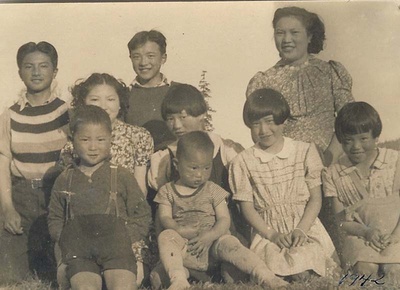
Cumberland 1941-42: Suyama borthers. (back row left to right) Kunio, Masayo, Tokugi, Meiko and Wakiko. (Front row to right) Eiji, Masahiro, me and Juneko.
Suddenly there was an interruption. Pearl Harbour was attacked and Canada was at war with Japan. In April 1942 we were all shunned and prohibited to attend public school. It was very annoying and shocking to see our family’s only radio being confiscated. Using the powers of the War Measures Act all people of Japanese ancestry were evacuated from the coastal regions to the interior of B.C. We were herded to temporary holding quarters in animal stalls at Hastings Park, Vancouver before we were shipped out to detention ghost towns. Some stayed for up to 6 months, but even under these severe adverse situations, the Nisei high school graduates volunteered and prepared themselves to teach the children so they would not lose time from their schooling. The Issei’s foremost goal was always about furthering their children’s education, no matter what.
At 10 years old, I was very confused. I was born in Canada and I was told I am Canadian but since my parents came from Japan, was I also considered Japanese? I thought to myself, why are we being treated like this? I had overheard my parents talking to their friends about these very important concerns and situations but still being young, these issues were only momentary thoughts. I was still living as a fun loving child.
Our forced detention started at Slocan, living in a tent for two weeks (Jokingly, Mama recalls it as the best time of her life as she didn’t have to cook and wash the floors). We then went on to Lemon Creek Internment Camp where we lived for a little over four years. Despite the isolation from the Canadian society, the Issei and the older Nisei generation firmly laid the groundwork for the future. At school the children were being prepared for the transition of assimilating back into the Canadian way of life once the war was over. Male members of the family, eighteen years old or over were sent to road camps or were forced to go to a prison camp at Angler, Ontario. Our family stayed together but sad to say, I did see signs of depression among some fathers who were unable to cope with all these social injustices.
During my detention days (age 11 to 15) my identity had started to form. I can vividly remember Mama in tears and so hurt when my parents received a mere $60 for their Cumberland house that the government had evicted them from and then auctioned off through the Custodian of Enemy Alien Property Act. I am certain that this was done to prevent people from returning home after the war. This was the first time I faced reality of how cruel humans are. Previously we had been looked down upon and treated like second class citizens but now the remaining rights had also been denied. I believed as did many others that the Canadian government was persecuting and discriminating against us simply because we were of Japanese decent. Germans and Italians were not treated like us. I had heard many stories of older generations having difficult times obtaining jobs that they were trained for after graduating from universities. I myself before and during detention had not experienced the discrimination the Issei and the older Nisei experienced as I always lived within a Japanese community. The only Occidental contacts I had were our dealing with the nearby General Stores but they were nice to us in a business sense. In this unprejudiced environment and with the strong influence of our elders, children generally led a happy life attending school, enjoying camp activities and of course obeying and honouring parents (oya ko ko).
In detention we were all in the same boat and nobody was trying to exercise his or her rights as Canadians, but feeling as our Issei parents, saying “shikata ga nai”, it can’t be helped. The schoolteachers did not make waves either. They sacrificed their time and energy to keep the students disciplined and progressing in every way. I am indebted to their influence for laying down the earlier foundation in my development.
Looking back at the way people were referring to “shikata ga nai” I firmly believe that the older generation was wiser than they gave them credit for and this was the most appropriate way of dealing with this difficult situation. Neither the general public nor the government of the day were experienced in such matters—we noticeably looked like the enemy so we must be the enemy—maybe even a spy. Fortunately the Western governments have learned a lot and human rights and social justice are foremost now in decision-making. All the wrong doings were caused by fear, insecurity, hate and discrimination and could this be compared to the present day equivalent to the term “ethnic cleansing”?
Today in Canada you are held accountable for your actions and social injustice will not be tolerated anymore. The Western Countries are now very careful and they try to do the right things. I myself feel “shikata ga nai” alone should no longer be used to describe what our parents were saying because the younger generations had been translating it just literally and using it negatively indicating that Issei were not vocal in raising their concerns. Perhaps a more positive and appropriate phrase to be added to it (which was understood) would be “gaman zuyoku akirame ta” which means together, it can’t be helped, tolerate, endure with inner strength, and don’t dwell on it as it was senseless to argue. Our elders held their dignity with faith and moved forward positively while encouraging rightful value in their children. Ever since discussions with Papa I have valued and practiced this tolerance and understanding approach for many situations.
*Acknowledgements are due to my husband, Frank who was my moral support and main editor along with Gordon, my youngest son for his editing and encouragements. I am indebted to Jeanie and Ken Oakley, my Clarksburg friends for also helping edit and polish my story. Theresa, my daughter and Wendy Hunter, my cottage neighbour gave me some ideas and encouragements too. I would like to thank Midge for inviting me to the conference that made it possible for me to make my emotional trip home to see my roots again in Cumberland, B.C. after 60 years of absence. We met so many nice friendly people during our journey and that alone made the trip worthwhile. Lastly, I was elated when my nephew, Bryan Bando’s wife, Elaine graciously volunteered to put together “Ba-chan’s Story” in a professionally designed attractive book form for me and I very much appreciate that.
**All photographs are courtesy of the author.
© 2002 Yoshimi Susan Maikawa


